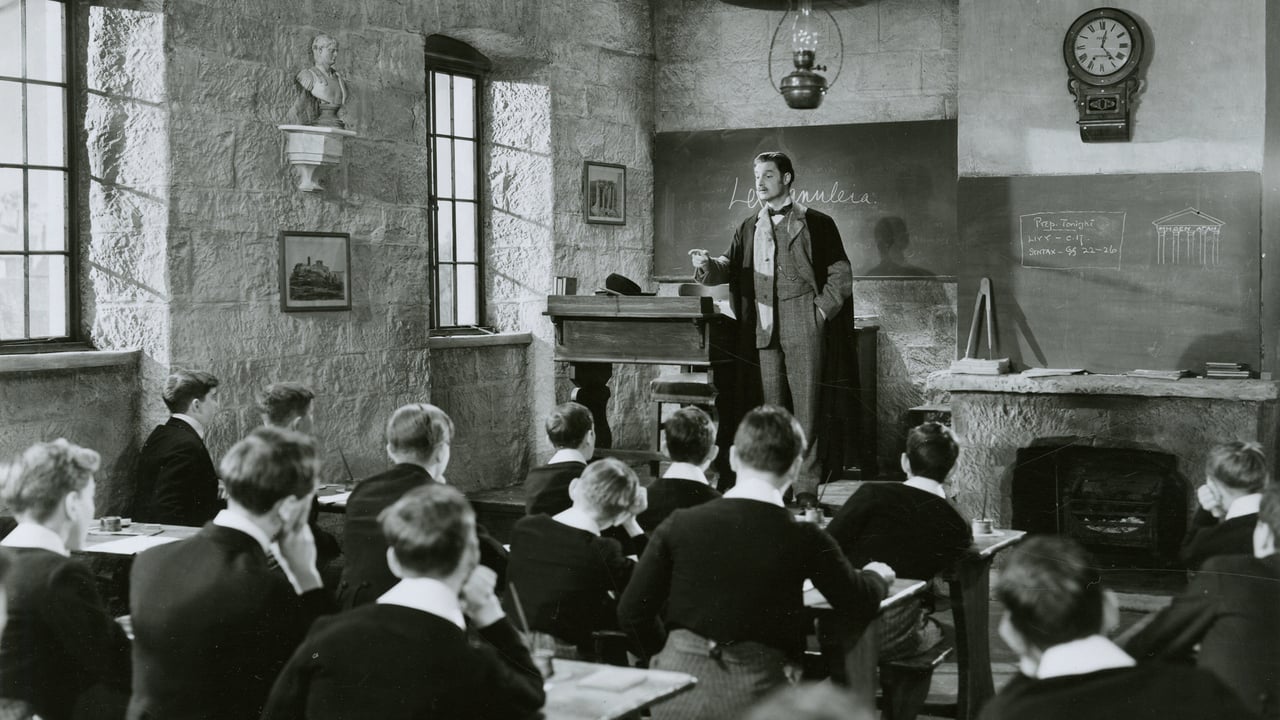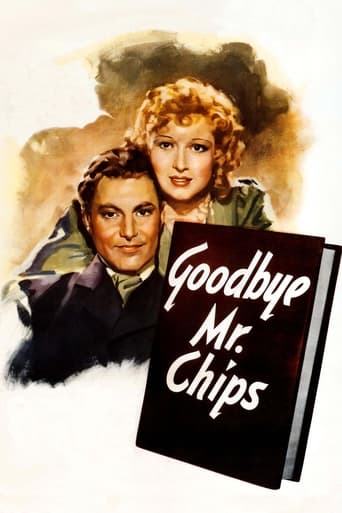



Wonderful character development!
Such a frustrating disappointment
Perfectly adorable
Excellent characters with emotional depth. My wife, daughter and granddaughter all enjoyed it...and me, too! Very good movie! You won't be disappointed.
View MoreThis is the original Chips movie (It stars Robert Donat; Peter O'Toole would later reprise the role). It is about a teacher who comes to an exclusive boy's school for his first experience. That experience proves disheartening as the boys make fun of him and manipulate him. He loses his idealism and turns 180 degrees. He becomes an authoritarian taskmaster who becomes anathema to his students and his colleagues. He gets production from his charges but they don't have the fun of learning. He even holds forth when a very athletic student can't play in a game because of his lack of effort and success in the classroom. He is amazingly consistent and bullheaded. Then along comes Greer Garson, who is the love of his life. For the first time he realizes that there is more to life than discipline. He is devoted to her, but tragedy shows its face and he must rethink his world. The last part of the film is absolutely gut wrenching and emotional. It will take a hard person not to react.
View MoreIf you watch this expecting a kind of topical biography of a teacher at an English school for boys, a gentle and unspectacular story, with romance, a growing acceptance of one's fate, and a lot of sentiment, you'll get what you expect.They run these sort of movies out from time to time. "It's a Wonderful Life," "Mr. Holland's Opus," "The Long Grey Line." The narratives tend to span generations. I found this one rather interesting and it's not surprising that it received so much public acclaim that Michael Redgrave was able to do a loony impression of Robert Donat's Mr. Chips in "The Lady Vanishes." You can't help liking it.Donat begins his teaching career as a nervous wreck, uncertain and stiff. But then he runs into Greer Garson in an improbable setting. Their marriage brings him a bit of ego strength. Of course, Garson (and the baby she's been carrying) have to die in order to boost the ratio of sentiment to everything else.Donat has one funny moment -- aside from his awkwardness. The Headmaster wants him to switch from the received pronunciation of Latin, in which "c" is pronounced "see", to the new modified and older version in which "c" is pronounce like "k". By this time, the middle-aged Mr. Chips has become defiantly laggard, declares hotly that he will never bring himself to pronounce Cicero as Kikero, and storms out the door.Yet, it's far from a comic story. If you like love, romance, tragedy, small triumphs, you'll love it.
View More1939 was truly a phenomenal year for movie lovers with such distinguished masterpieces as "Gone With the Wind", "The Wizard of Oz", "Mr. Smith Goes to Washington" to start with the most emblematic ones, and followed by the no less revered "Stagecoach", "Ninotchka" or "Young Mr. Lincoln" Yet, despite its lower recognition, "Goodbye, Mr. Chips", also Best Picture nominee, is still likely to grab the attention of a movie fan because it features the performance that won the Oscar for Best Actor, which is saying a lot in 1939. No, it was not James Stewart who won for his outstanding emotional role as Jefferson Smith, neither did Clark Gable as the iconic Rhett Butler or Laurence Olivier as Heathcliff, no fate decided that the prestigious award would go to a Robert Donat who played a shy and humble schoolmaster named Arthur Chipping aka 'Mr. Chips'. I admit that I was less eager to see the film than the performance that beat those stellar performances but the result was the same anyway. First, "Goodbye, Mr. Chips" is significant as a milestone for school movies. "Dead Poets Society", "To Sir, With Love", "Blackboard Jungle", they all owe something to "Goodbye, Mr. Chips", the inspirational story of a teacher who dedicated his whole life, 63 years, to his profession, to his boys. But don't expect the life-changing teacher, who'd open his pupils' eyes. Sam Wood's film is beyond the stereotypes it will later inspire. All we have is just a man who'll learn the most difficult job in the world and the noblest, something that demands courage, patience, understanding and a sincere enthusiasm. His authority is challenged in the beginning, making him question if he's fit to the job, but progressively, he'll try to learn to find the right balance. But it's only by meeting his future wife that his status in Brookfield will go from a good teacher to the living legend.Greer Garson, as Susan, was nominated for an Oscar in a leading role, and I can understand why it leaves some viewers perplexed. But I think she exemplifies the importance of a woman in man's life, and no man is shy enough to never find the true love, and certainly not a good man like Chips. Susan will lead the lead character, teaching him how to smile, how to overcome his own weaknesses, how to make a friend out of his kids, much more, she's the one who'll earn him his nickname. The film's second act entirely focuses on the relationship between Chips and Susan, their romantic waltz in Vienna, the Blue Danube music. And although it tragically ends with her precocious death by giving birth, we understand that she paved the way to Chips' popularity and helped him to become a living legend. I was also interested to see the film because Chips was listed in AFI's Top 50 Greatest heroes, and I wanted to know what was so inspiring about him. I think he's like Rocky Balboa, a sort of ideological hero who conveys positive values about life, about remaining true to a sort of a positive discipline. He's a man who faced war, the death of his wife, of colleagues, friend and of course pupils, and still he took the distance. Full of contradictions, he was capable of teaching during German bombings and yet delivers a eulogy to one of his German friends who taught at Brookfield. Chips valued life too much to get stuck in patriotic exaltations. He was a good man, eccentric, charismatic, funny, but a positive model.And if by no means, "Goodbye, Mr. Chips" is equal to "Gone With the Wind", in its own humbleness and simplicity, the film is capable to reach a superior emotionality that doesn't rely on epic moment or powerful dialog. It's just the sight of this humble man, going older and older, yet never letting his love toward his profession and pupils being altered by the passing of time. Robert Donat is magnificent as Mr. Chips, and I couldn't believe a 34-year old could play an old man in such a convincing way, in this cute way to stick his mouth to his mustache or to emphasizes the 'o'. Going from this mild-mannered playboy to a shy middle-aged man and then an old Einstein-looking elderly is indeed a performance that deserved an accolade. But Donat's performance and the impressive ways were not the only way to suggest the passing of time. When he comes in Brookfield to start as a teacher, kids talk about Prussians defeating the French, well the film demands a little knowledge, but we understand it's in 1870. Later, the year 1901 is indicated when a student comments about Queen Victoria's death and can't believe Britain will have a king. This summarizes what Chips incarnates: longevity. He's a 83 year old schoolmaster, a living legend, loved and admired, who's so old in his school that he taught three generations of boys, an element of his life cleverly highlighted by the three Colley's kids, all played by the same kid. Still, one of the most representative moments of the film is the many montages of pupils and students filing past and recalling their names. The flow of kids, of new faces, of children and young men, is like a metaphoric view of life as a river where it's never the same water that runs. And combined by with the ringing bells and the film's outstanding music in high volume, and Chips' deathbed words, it's impossible not to be touched by this film, and its lead character, a sympathetic character full of this same innocence that would be lost after 1939 and Hollywood would see the rise of more cynical and fatalistic genres, like the film-noir. Chips dies with his innocence, but his remembrance is eternal.
View MoreAfter seeing this original version five times myself, I watched the DVD with two friends, both younger, one half my age who, as well as being brought up in this modern digital age, went to the same grammar school as me.They too, melted in the nostalgia, the post Christmas goodwill spilled over as those glorious MGM production values mixed with England's finest virtues washed over them and their senses. Yes, it is wonderfully stagey and stilted but is never predictable and best of all, is not syrupy and "isn't everything wonderful".Blending the perfect ratio of pathos with sentimentality, Robert Donat is endearingly coy and awkward, as Chips. Greer Garson is the film's, as well as Mr Chipping's revelation, adding decency, balance and a touch of glamour. Their meeting and courtship in Austria, ably assisted by Paul Henreid, (later to star in Casablanca) is a welcomed break from the dusky schoolrooms. The schoolboys all love her, they in turn respect and admire her husband. There's a superb attention to detail that amply reveals that teachers are always too aware of the naughtiness or their charges and actually almost encourage it, it being a formative process for unconfident, rather frightened little boys and onto and into the young men that will fight - and die for - their beloved England.The sense of history is well handled, with casual remarks that mark out various historical occasions and Donat time-travels through 60 years of ageing, from 20 odd to 80+, at each stage he commands, in speech, body language and credibility. Wartime Brit favourite John Mills stars briefly as one of the older boys keen to see active service. There was a huge sense of satisfaction - and pride - from us all at the end of watching Goodbye Mr Chips. That it stole so many Oscars from Gone With the Wind is both reassuring and remarkable, too.
View More